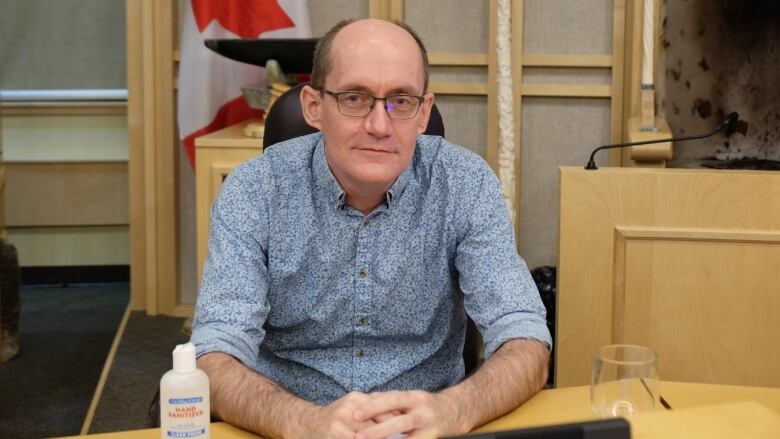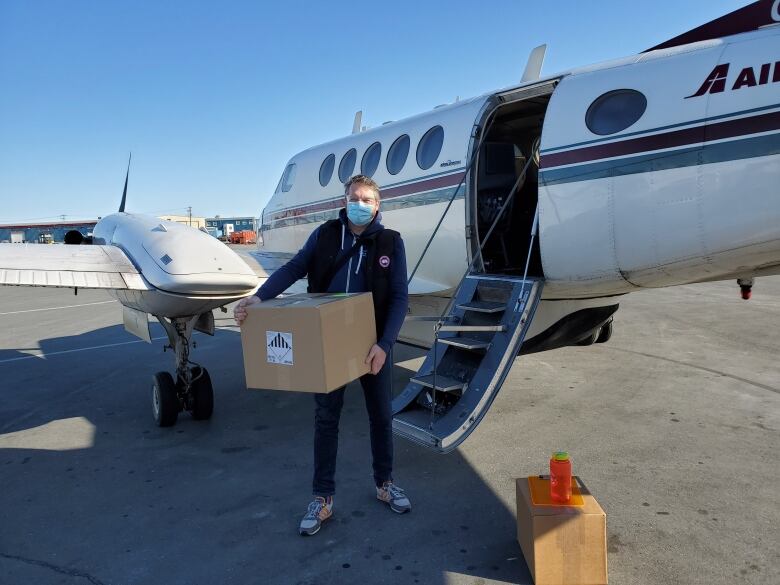House parties main cause of Iqaluit's COVID-19 spread, Nunavut officials say
30 COVID-19 cases in Iqaluit are in youth under 18 years old

Visiting and social gatherings are the main cause of spread in Iqaluit right now, Nunavut's Chief Public Health Officer Dr. Michael Patterson said at a press conference on Thursday.
Patterson said there'd been at least three parties that have triggered transmission of COVID-19 in the city, but there may have been more.
Anyone who has attended a house party in the last three weeks is asked to contact the hotline and request swabbing, he said.
If people say they've been to a party, Patterson said that information will not be used against them. Public health will use it to reduce the spread, and it will not be passed on to law enforcement.
"We've been able to link a number of cases from some parties and follow transmission into the household," Patterson said.
When the Iqaluit outbreak began the major sites of transmission were workplaces. That'snow changed.
The lockdown has reduced people's average number of contacts and for much of the last week Patterson said new cases have one or no contacts outside their household.
"There was a blip after a party a few days ago where the average was three or four contacts [outside of who they live with] per new diagnosis," Patterson said.
Premier Joe Savikataaq announced 12 new cases on Thursday, bringing Iqaluit's total to 84 cases and the territory's total to 86 cases as there are two cases in Kinngait.
Pfizer plans fuzzy
Earlier this week, Health Canada approved the Pfizer vaccine for teens in Canada for ages 12 to 18.
With Nunavut's young population, Dr. Michael Patterson said earlier this year he was closely watching trials to approve vaccines in youth. About 37 per cent of Nunavummiut are under 18.
There are now 30 cases of people under the age of 18 who'vetested positive for COVID-19 in Iqaluit. Patterson says about 40 per cent of Iqalummiut are under 18.
The Pfizer vaccine presents logisticalchanges for the territory as it must be shipped and stored at - 80 C and Patterson said even in a freezer it's only good for two weeks once it's thawed, it has to be used within five days.
However, Iqaluit does have the capability to store the Pfizer vaccine, he said.
"The difficulties in getting that out into remote communities, it's a big challenge for everyone," Patterson said.
He referenced the Northwest Territories, which has so far only announced it'susing the Pfizer shots in Yellowknife and nearby Behchoko.
The N.W.T. government swapped some of its Moderna vaccine with British Columbia for the Pfizer shots to start vaccinating youth.
Patterson opted to end Nunavut's travel bubble with the Northwest Territories on Monday, after officials in the N.W.T. announced multiple COVID-19 cases in Yellowknife connected to a school outbreak.

Vaccination rates plateau
For the last few days the number of fully vaccinated adults in Nunavut has been creeping up by about 60 to 70 people a day.
On Wednesday, 50 per cent of adults in the territory were fully vaccinated. In Iqaluit, 80 per cent of adults have received at least one dose of the vaccine.
Many Iqalummiut have received their first dose and have to wait the requisite four weeks for their second, which is part of the reason for the plateau, Patterson said. He expects the numbers to jump once that wait is over.
While the Yukon has announced it will drop its self-isolation requirement for fully-vaccinated people enteringthe territory later this month, Patterson said Nunavut is a long way from that.
"We need to see a couple of things in order to make that switch,number one getting the vaccine uptake among Nunavummiut higher, so the risk is lower, and also the measurements of how much impact the vaccine has on the spread of the virus," Patterson said.
More Yukoners have been vaccinated than Nunavummiut and more of its population is eligible to get vaccinated. Both those things make a difference Patterson said.
Patterson reminded people that the vaccine is still available in every Nunavut community.As of Thursday 16,271 Nunavummiut have received their first dose of the Moderna vaccine, while 12,692 residents have received both doses.
Jails to have mass COVID-19 screening
There are now 10 active cases in Iqaluit's inmate population, all are doing well and isolating at the Baffin Correctional Centre.
Since the number of staff with the virus is fewerthan five Patterson wouldn't give specific numbers.
Thursday or Friday the government is planning a mass COVID-19 screening at the jails to confirm if there is transmission within the jails. Patterson says the current cases were likely contracted before the virus was discovered.
In total there have now been three people medevaced to Ottawa from the Iqaluit outbreak.
Patterson said the Tammaatavvik boarding home is safe for people to stay at after a staff member tested positive for COVID-19 last week. Fewer than five staff have tested positive for COVID-19 Patterson would not say the exact number for privacy reasons.
"It is safe, there have been no COVID-19 cases confirmed in clients from the boarding home, the staff who tested positive and those who are high risk contacts are in isolation," Patterson said.
Extra precautions are in place to keep clients safe, he said. Food and beverages are being delivered to the rooms, only clients are allowed to be on the property and they are asked to limit their trips outside ofthe boarding home as much as possible.
Those cleared to return home after their treatment are still required to isolate for 14 days after returning to their community, as must any household members.
The City of Iqaluit declared a local state of emergency Monday afternoon at an emergency city council meeting. Iqaluit's mayor Kenny Bell said the emergency empowers the city's bylaw officers to enforce the territorial lockdown rules.












_(720p).jpg)


 OFFICIAL HD MUSIC VIDEO.jpg)
.jpg)



























































































